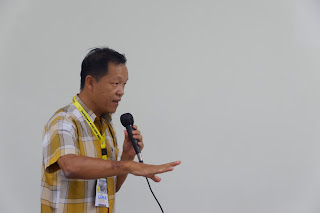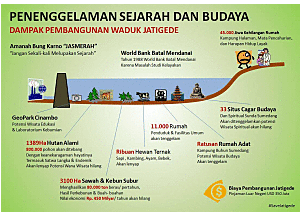[ACSC/APF 2023] Rural Women Building Agroecology as an Alternative Movement Against False Solutions in Large Oil Palm Plantations | CS 4: Climate and Environmental Justice
Introduction
Amidst the towering
palm trees and sprawling plantations of Indonesia, a transformational movement
is quietly taking root. In a world grappling with the environmental and social
challenges posed by the palm oil industry, rural women are emerging as the
unsung heroes of change. In a recent workshop titled "Rural Women Building
Agroecology as an Alternative Movement against False Solutions in Large Oil
Palm Plantations," organized by SERUNI (Serikat Perempuan Indonesia) and
Ibon International, the resilience and determination of these women shone
brightly against the backdrop of one of the world's largest palm oil producers.
Indonesia's palm
oil industry has witnessed exponential growth over the years, making it a
global powerhouse in palm oil production. However, this expansion has come at a
tremendous cost. The workshop delved on the topic of "false
solutions—purported remedies that claim to mitigate the environmental and
social impacts of palm oil production but ultimately fall short, failing to
address the root issues, including deforestation, habitat degradation, and
social conflicts.
Unmasking the Green Myth
In the oil palm
industry, a pressing concern revolves around the prevalence of "false
solutions." These are ostensibly remedies that claim to address the
environmental and social challenges associated with palm oil cultivation but,
in practice, fall short of addressing the root issues.
One glaring example
is the existence of certification schemes like the Roundtable on Sustainable
Palm Oil (RSPO), which has faced criticism for its inability to prevent
deforestation, human rights violations, and land seizures. Despite their
professed intentions, these schemes often lack the teeth to deliver substantial
changes on the ground.
Another problematic
practice involves the promotion of high-yield oil palm varieties. While
seemingly logical for boosting productivity, it can inadvertently result in an
expansion of monoculture plantations, exacerbating habitat loss and soil
degradation. The pursuit of higher yields can compromise environmental
sustainability.
Critiques of false
solutions are multifaceted. They can create a deceptive facade of
sustainability, misleading the public and hindering genuine efforts to
transition to sustainable land use and agricultural practices. Moreover, false
solutions often prioritize short-term economic gains at the expense of
long-term environmental and social well-being.
In parallel, the
palm oil industry grapples with "greenwashing." This entails
misleading marketing and branding that portray palm oil products as
environmentally friendly or sustainable, even when they fall short of such
standards. For instance, companies may claim to produce "sustainable"
palm oil while contributing to deforestation and displacing indigenous
communities. Greenwashing can mislead consumers, delay industry reforms, deter
regulatory action, and erode trust in supply chains.
Navigating the Landscape of Sustainable Alternatives: The
Good Food Community Experience in the Philippines
In the
ever-evolving journey toward sustainable practices, the "Good Food
Community" in the Philippines stands as an illuminating example. This
initiative not only exemplifies the unwavering determination of farmers to
secure their sustenance and independence but also showcases the pivotal role of
women in the "Pamayanihan" project. These women serve as the
guardians of family well-being and the custodians of seeds, both in a literal
and cultural sense. However, their labor and care often remain invisible,
emphasizing the need for greater recognition.
As oil palm
plantations replaced traditional rubber and food crops, women lost access to
their small farms, leading to decreased participation in co-production
activities and increased economic dependence on men in these rural areas. This,
in turn, has significantly contributed to high unemployment rates among women.
Themes intertwined
with the values of "Pamayanihan" and the "Good Food
Community" experience encompass:
●
Co-Creation of Knowledge: Both
initiatives involve a collaborative effort to generate knowledge and solutions,
drawing upon the wisdom and insights of various stakeholders, with a particular
focus on women's contributions.
●
Social Values and Diets: These initiatives
address the social values connected with food systems and diets, emphasizing
the importance of nurturing local traditions and cultures.
●
Participation: The "Good Food
Community" actively involves women as key participants, recognizing their
indispensable role in shaping and sustaining the initiative. Together, they
navigate the landscape of sustainable alternatives in pursuit of a more
equitable and resilient future.
River Restoration and Youth-Led Agricultural Innovation
Another inspiring
initiative highlighted during the workshop was the advocation brought by Sindy
Novela, a Jambi beauty queen 2023 from Puteri Indonesia Foundation. This
endeavor sprang from a deep-seated addressing climate and environmental impacts
of gold mining and oil palm plantations, evolving into a commitment to river
and soil restoration and sustainable agriculture. By adhering to agroecological
principles, the community not only grows fruits and vegetables abundantly but
also cultivates a sense of environmental stewardship.
Perhaps the most
promising aspect of this is its focus on educating the younger generation about
environmental restoration. By empowering youth and women with knowledge and
practical experience, the community ensures that the torch of change is passed
on, guaranteeing the continuation of this vital work.
Workshops and Questions
During the
workshop, critical questions were posed:
●
Did you include the family in the
agroecological practices? Is it providing additional income for women and their
families?
○
Indeed, the initiative actively
involves not only women but also their families. Recognizing that women often
receive meager wages due to poor working conditions in palm oil plantations,
families are frequently integrated into the work. Collective organic farming
within reclaimed land on plantations is a key component of this strategy, aimed
at both market sales and daily consumption, thus contributing to the additional
income of families.
●
How can we call upon the
government to subsidize farmers in this space?
○
While government representatives
declined participation in the workshop, the workshop organizers emphasized the
importance of asserting their space as a civil society platform. This platform
enables them to voice their demands to ASEAN stakeholders during the ASEAN
Summit, culminating in a communiqué to be submitted to the summit.
Recommendations
The workshop
concluded with vital recommendations:
●
ASEAN Climate and Environmental
Convergence Body:A multifaceted approach that places rural women at the
forefront of advancing people's alternatives should be pursued.
●
Amplifying CSO Voices: ASEAN
should create space for civil society organizations to amplify the voices of
the most marginalized, fostering collective examination of relationship
dynamics at all levels, promoting collective work and diverse participation, sharing
best practices, and celebrating heritage.
●
Government Subsidies: The
governments of Indonesia and ASEAN member countries must provide subsidies for
farmers, particularly women farmers, to sustain small-scale production of both
endemic food crops and livestock, thus enabling people to achieve food
sovereignty.
Conclusion
In the heart of
Indonesia's palm oil plantations, the workshop on "Rural Women Building
Agroecology as an Alternative Movement against False Solutions in Large Oil
Palm Plantations" unveiled a story of hope and resilience. Rural women,
often overlooked in the narrative of palm oil's impact, are now emerging as
pioneers of change. Their determination to embrace agroecology and their
commitment to environmental restoration underscore the importance of supporting
their efforts. As they fight for justice on both environmental and social
fronts, they remind us all that empowerment begins with recognizing the
strength and potential of those who have long been marginalized.










Posting Komentar